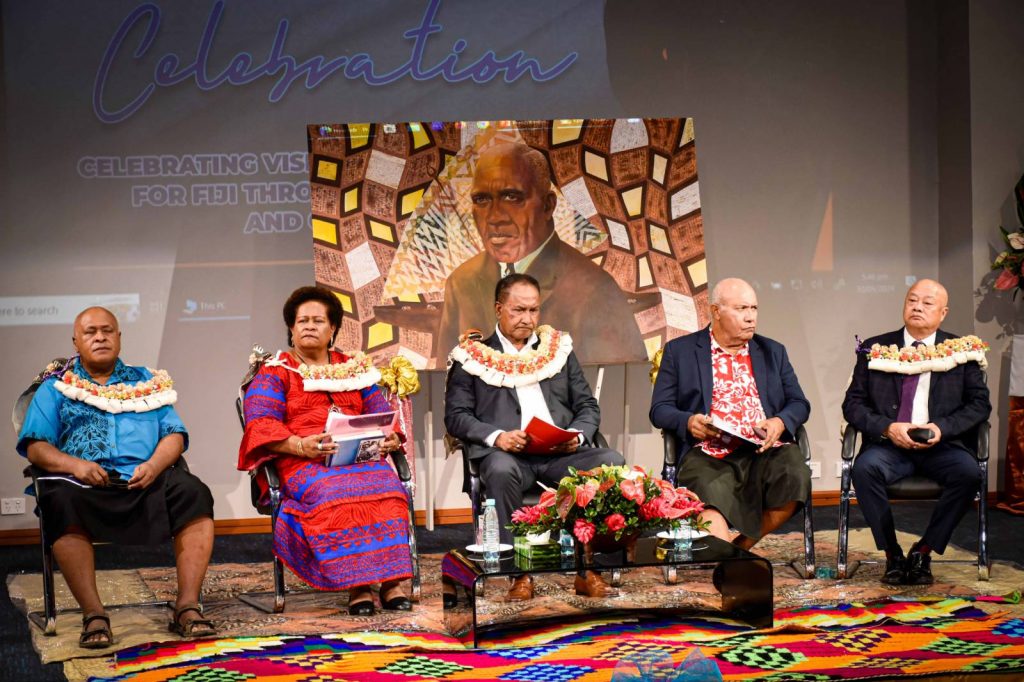

CBHTS Dean Dr Asaeli Tuibeqa, FNU Vice-Chancellor Unaisi Nabobo-Baba, Distinguished Professor Steven Ratuva and Graham Leung at the Public Lecture on Ratu Sir Lala Sukuna.
Fijian statesman Ratu Sir Lala Sukuna was lauded for his interdisciplinary approach to leadership, a leadership that needs to be adopted for a visionary leader.
These were shared at the Public Lecture hosted by the Fiji National University to commemorate the Ratu Sir Lala Sukuna Day last week.
The programme culminated in a public lecture delivered by Distinguished Professor Steven Ratuva on the theme “Celebrating Visionary Leadership for Fiji through Education and Culture.”
Professor Ratuva’s lecture provided a comprehensive analysis of Ratu Sir Lala Sukuna’s significant contributions to Fiji. He explored how Ratu Sir Lala Sukuna’s vision for education and cultural preservation played a pivotal role in shaping the nation’s development.
The engaging presentation drew a diverse audience of FNU faculty, staff, and students, fostering a deeper understanding of this iconic figure.
“Ratu Sir Lala Sukuna was an interdisciplinary thinker. He was not only limited in terms of his ideas to a particular discipline like politics in the universities where they put you in and you remain there until you finish, and they give you a degree,” Professor Ratuva said.
“He was a master even as early as the 1920s. He was an interdisciplinary thinker and writer in economics, social anthropology, sociology, criminology, history, and law.”
Na Gone Turaga Na Roko Tui Bau, Ratu Timoci Tavanavanua talked about the family tree of Sir Lala Sukuna.
“This outpouring of love and respect shows that even 66 years after his death, Ratu Sukuna holds revered status in Fijian history and culture,” he said.
FNU Vice-Chancellor Professor Unaisi Nabobo-Baba highlighted Ratu Sir Lala Sukuna’s verbal and written communication skills.
“The speeches in the Ratu Sir Lala Sukuna book depict a vibrant man, and I find myself impressed by two aspects. The first is that he is real and does not pretend. Secondly, because I am an English teacher, his command of the language is very respectful,” Professor Nabobo-Baba said.
“Ratu Sir Lala Sukuna was a fluent English speaker, and for a Fijian to speak like a first language speaker, it tells us that in Natabua, where the English teachers are learning to be English teachers, that is doable. You learn and don’t sleep until you master the language.”
Renowned lawyer Graham Leung highlighted the achievement of Ratu Sir Lala Sukuna, who played a pivotal role in establishing the Native Land Trust Board in 1940.
“Without a shred of doubt, he was the most outstanding Fijian of his generation, and he towered above his compatriots,” Leung said.
“We take for granted today that the creation of the Native Land Trust Board in 1940 was a singular monumental achievement that Ratu Sukuna accomplished. Demarcation of the native land was one of his most outstanding achievements.”
College of Business, Hospitality and Tourism Studies Dean, Dr Asaeli Tuibeqa, said Fiji needs to learn from Ratu Sir Lala Sukuna to have visionary leaders to take Fiji forward.
“We need to nurture a country of strategic leaders, critical thinkers, innovators, and entrepreneurs. We need people who know, not those who know people,” Dr Tuibeqa said.
“However, this is my grassroots observation. Fiji is going through a descent destructive condition, not because of the 10-billion-dollar debt but because of a serious lack of visionary leaders. Indeed, we need leaders who can create and articulate a future and, of course, have the ability to understand the GDP.
“We are destroying our young people and future leaders. This is a manifestation of a destructive state. The consequences of lack of visionary leaders.”